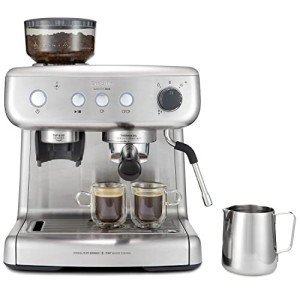Home Use Espresso Machines: A Comprehensive Guide
Espresso machines have ended up being a staple in lots of families as coffee enthusiasts look for to duplicate café-quality brews in the convenience of their kitchens. The increase in popularity has actually led to a varied market filled with different designs, functions, and costs. This post intends to supply an informative introduction of home use espresso machines, helping readers navigate their options efficiently.
Comprehending Espresso Machines
Espresso machines work by requiring warm water through finely-ground coffee under high pressure, leading to a focused coffee beverage called espresso. There are a number of kinds of espresso machines categorized based upon their developing approaches and level of automation. The most common types include:
- Manual Espresso Machines: These need the user to manage the pressure and water circulation, permitting for a more hands-on coffee-making experience.
- Semi-Automatic Espresso Machines: These offer automatic control over water pressure, while the user manually grinds and tamps the coffee.
- Automatic Espresso Machines: With the push of a button, these machines automatically control the circulation of water, making it easier to brew espresso with consistent outcomes.
- Super-Automatic Espresso Machines: These all-in-one machines deal with grinding, tampering, brewing, and even milk frothing, making them perfect for users looking for convenience.
- Pill or Pod Machines: These use pre-packaged coffee pods to create espresso with minimal effort, but they restrict option in brewing techniques and flavors.
Table: Comparison of Espresso Machine Types
| Type | Control Level | Ease of Use | Cleaning up Level | Ideal For |
|---|---|---|---|---|
| Manual | User-controlled | Moderate | High | Coffee perfectionists |
| Semi-Automatic | Partial automation | Moderate | Moderate | Home baristas |
| Automatic | Fully automated | Easy | Low | Busy individuals |
| Super-Automatic | Fully automated | Really simple | Extremely low | Convenience candidates |
| Capsule/Pod | Fully automated | Really easy | Really low | Casual drinkers |
Key Features to Consider
When choosing a home use espresso machine, it's vital to think about various functions that can considerably affect the quality of espresso and user experience.
- Pressure: Look for machines that provide a minimum of 9 bars of pressure, as this is considered optimum for brewing espresso.
- Boiler Systems: Single vs. dual boiler systems identify temperature level stability and the capability to brew espresso and steam milk at the same time.
- Grinder: Integrated mills permit for freshly ground coffee, which enhances flavor. Consider machines with adjustable grind settings.
- Milk Frother: For those who delight in cappuccinos and lattes, an integrated steam wand or automatic frother is vital.
- Size and Design: Consider your kitchen area area and aesthetic choices. Machines can be found in different sizes, from compact to big setups.
- Rate: Home espresso machines can vary from a couple of hundred to a number of thousand dollars, so it's important to develop a budget before exploring choices.
Advantages and disadvantages of Home Use Espresso Machines
| Pros | Cons |
|---|---|
| Convenience of developing coffee at home | Initial financial investment can be high |
| Quality of espresso is typically superior | Needs some skill, specifically with manual machines |
| Capability to try out flavors | Maintenance and cleansing can be labor-intensive |
| Can save money in the long run | Not all machines will match every coffee choice |
Maintenance and Cleaning Tips
Maintaining an espresso machine is essential for prolonging its life and making sure consistent brew quality. Here are some useful pointers:
- Regular Descaling: Minerals from water can develop in the machine. Descale every 1-3 months, depending on water solidity.
- Daily Cleaning: Rinse portafilters, baskets, and steam wands after each use to prevent coffee oils from building residue.
- Use Filtered Water: This can help minimize mineral accumulation and improve the taste of coffee.
- Replace Gaskets and Seals: These parts might wear in time and ought to be replaced to preserve pressure and efficiency.
- Read the Manual: Each machine has particular care directions; following these will ensure durability.
FAQs About Home Use Espresso Machines
Q1: What is the best budget espresso machine?The best budget espresso machine often depends upon private requirements, but designs like the DeLonghi EC155 or the Breville Bambino are popular among users for providing terrific value. Q2: How long do home espresso machines generally last?With appropriate maintenance, home espresso machines can last anywhere from 5 to 15 years, depending upon the quality of the machine and frequency of use. Q3: Can I make cappuccinos and lattes with any espresso machine?While most espresso machines can make coffees and lattes, having a dependable
steam wand or frother is necessary for attaining the ideal milk texture.
Q4: Are super-automatic machines worth the investment?For those who prioritize benefit and quick brewing, super-automatic machines can be worth the financial investment, though they may do not have some customizability in brew strength and taste. Q5: What types of coffee beans are best for espresso?While personal choice plays a role, beans labeled as" espresso "blends are usually roasted darker, producing rich tastes and a velvety texture when brewed.
Investing in a home espresso machine can transform the day-to-day coffee routine into something unique, elevating home brews to café quality. By understanding the various kinds of machines, crucial functions to consider, maintenance needs, and weighing the
advantages and disadvantages, consumers can make informed decisions that suit their specific preferences. As Espresso Maker Online continues to grow, no matter the option, every brew can be a scrumptious experience waiting to be enjoyed.

